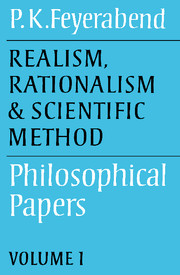Crossref Citations
This Book has been
cited by the following publications. This list is generated based on data provided by Crossref.
Munevar, Gonzalo
1986.
Consensus and Evolution in Science.
PSA: Proceedings of the Biennial Meeting of the Philosophy of Science Association,
Vol. 1986,
Issue. 2,
p.
120.
Mulaik, Stanley A.
1986.
Toward a Synthesis of Deterministic and Probabilistic Formulations of Causal Relations by the Functional Relation Concept.
Philosophy of Science,
Vol. 53,
Issue. 3,
p.
313.
Laudan, Larry
Donovan, Arthur
Laudan, Rachel
Barker, Peter
Brown, Harold
Leplin, Jarrett
Thagard, Paul
and
Wykstra, Steve
1986.
Scientific change: Philosophical models and historical research.
Synthese,
Vol. 69,
Issue. 2,
p.
141.
Kalmar, David A.
and
Sternberg, Robert J.
1988.
Theory knitting: An integrative approach to theory development.
Philosophical Psychology,
Vol. 1,
Issue. 2,
p.
153.
Laudan, Rachel
Laudan, Larry
and
Donovan, Arthur
1988.
Scrutinizing Science.
p.
3.
KARMILOFF‐SMITH, ANNETTE
1988.
The Child is a Theoretician, Not an Inductivist*.
Mind & Language,
Vol. 3,
Issue. 3,
p.
183.
George Couvalis, Spyridon
1988.
Discussion: Feyerabend and Laymon on Brownian Motion.
Philosophy of Science,
Vol. 55,
Issue. 3,
p.
415.
Eisenhardt, K. M.
1988.
AGENCY- AND INSTITUTIONAL-THEORY EXPLANATIONS: THE CASE OF RETAIL SALES COMPENSATION..
Academy of Management Journal,
Vol. 31,
Issue. 3,
p.
488.
Finocchiaro, Maurice A.
1988.
Scrutinizing Science.
p.
49.
Galison, Peter
1988.
History, Philosophy, and the Central Metaphor.
Science in Context,
Vol. 2,
Issue. 1,
p.
197.
Gholson, Barry
and
Houts, Arthur
1989.
Toward a cognitive psychology of science.
Social Epistemology,
Vol. 3,
Issue. 2,
p.
107.
Preston, John M.
1989.
Folk psychology as theory or practice? The case for eliminative materialism.
Inquiry,
Vol. 32,
Issue. 3,
p.
277.
Harris, R. Allen
1990.
Assent, Dissent, and Rhetoric in Science.
Rhetoric Society Quarterly,
Vol. 20,
Issue. 1,
p.
13.
Shionoya, Yuichi
1990.
Instrumentalism in Schumpeter's Economic Methodology.
History of Political Economy,
Vol. 22,
Issue. 2,
p.
187.
Ramsey, William
Stich, Stephen
and
Garan, Joseph
1990.
Philosophy, Mind, and Cognitive Inquiry.
Vol. 3,
Issue. ,
p.
117.
Sankey, Howard
1990.
In defence of untranslatability.
Australasian Journal of Philosophy,
Vol. 68,
Issue. 1,
p.
1.
Oberdan, Thomas
1990.
Positivism and the Pragmatic Theory of Observation.
PSA: Proceedings of the Biennial Meeting of the Philosophy of Science Association,
Vol. 1990,
Issue. 1,
p.
25.
Schwartz, Justin
1991.
Reduction, Elimination, and the Mental.
Philosophy of Science,
Vol. 58,
Issue. 2,
p.
203.
Preston, John M.
and
Soble, Alan
1992.
Book reviews.
International Studies in the Philosophy of Science,
Vol. 6,
Issue. 2,
p.
155.
Amsterdamski, Stefan
1992.
Between History and Method.
Vol. 145,
Issue. ,
p.
153.





